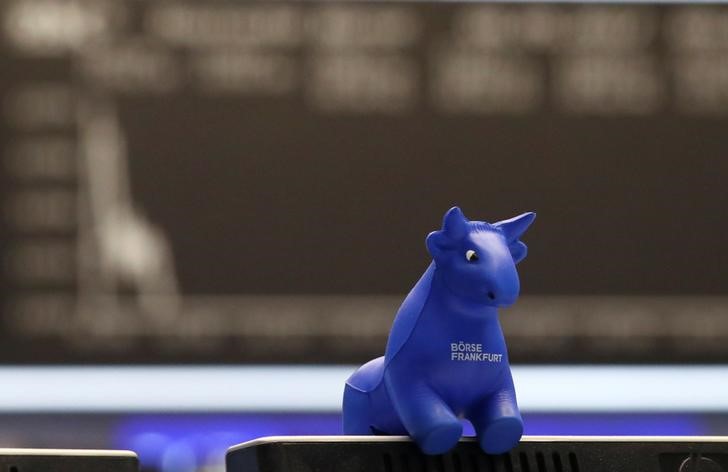Ukraine proposes $100 bln US weapons deal for security guarantees - FT
Investing.com - European stocks slipped lower Wednesday, with investors fretting over elevated inflation while digesting more corporate results as the new earnings season kicks into gear.
At 03:05 ET (07:05 GMT), the DAX index in Germany dropped 0.4%, the CAC 40 in France slipped 0.3% and the FTSE 100 in the U.K. fell 0.1%.
Trade woes hit sentiment
Sentiment has fallen in Europe this week after U.S. President Donald Trump announced he would be introducing 30% tariffs on imports from the European Union, effective from the start of August.
European ministers remained convinced they can bring Trump back from the brink before the deadline and reach a deal that would keep the $1.7 trillion two-way trading relationship broadly intact, but uncertainty reigns.
This has resulted in the outlook for European corporate health deteriorating, with these companies expected to report a drop of 0.7%year-on-year in second-quarter earnings, on average, according to LSEG I/B/E/S data, below the 0.2% decrease expected a week ago.
Earnings continue to flow
ASML (AS:ASML) reported second quarter bookings ahead of expectations, but the world’s biggest supplier of computer chip-making equipment warned that it may not achieve growth in 2026.
Luxury giant Richemont (SIX:CFR), the Swiss parent of Cartier and Van Cleef & Arpels, posted a bigger than expected jump in revenue for the first quarter, led by continued strength in its Jewellery Maisons, while margin pressures remain a concern.
Handelsbanken (ST:SHBa) reported a 12% drop in second-quarter operating profit from the previous quarter, as lower net interest income and trading losses weighed on earnings.
The U.S. earnings season has also just gotten underway, with the results from banking giants JPMorgan Chase (NYSE:JPM) and Citigroup (NYSE:C) generating a mixed market response on Tuesday.
There are more bank earnings due later in the session from the likes of Goldman Sachs (NYSE:GS), Morgan Stanley (NYSE:MS) and Bank of America (NYSE:BAC), while Johnson & Johnson (NYSE:JNJ) will give more of a snapshot of how consumers are faring.
Inflation remains a concern
Elevated inflation levels are also causing investors to fret, after U.S. consumer price data came in higher than expected on Tuesday.
Britain’s annual rate of consumer price inflation also unexpectedly rose to its highest in over a year at 3.6% in June, according to data released earlier Wednesday.
This brings watching U.S. factory inflation, due later Wednesday, firmly into focus as investors seek more information on when the Federal Reserve may next cut interest rates.
Crude bounces on OPEC outlook
Oil prices rose Wednesday, bouncing after two days of losses, helped by a group of top producers maintaining its healthy global demand outlook.
At 03:05 ET, Brent futures climbed 0.3% to $68.89 a barrel, and U.S. West Texas Intermediate crude futures rose 0.4% to $66.80 a barrel.
That reversed two days of declines as the market downplayed the potential for supply disruptions after U.S. President Donald Trump threatened tariffs on purchases of Russian oil.
The Organization of the Petroleum Exporting Countries maintained its oil-demand forecast for 2025 and 2026, expressing optimism that global trade tensions will ease in the coming months.
It stated that the global economy could see stronger-than-anticipated growth in the second half of the year, despite trade conflicts.
